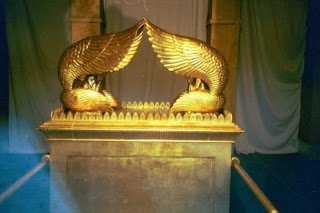Continuing from Part 18, having established God's attributes of authority and greatness, justice and righteousness, the psalmist moves on to his application.
3) THE LORD IS REVEALED
God's holy nature is revealed through His dealings with humanity. For the LORD rules with equity when He allows His people to pray and intercede for others; when, altogether just, He yet forgives sins; and when also He allows forgiven sinners to reap the full consequences of their sins. In other words, our God is wonderful, forgiving, and gracious - but because He is also just and mighty, the very thought of sin should strike fear in our hearts. Realization of both aspects of God's character helps us understand that God is holy, and this understanding results in TRUE WORSHIP to Him!
To illustrate these truths, the psalmist provides instructive examples from the lives of three of God's choice servants.
"Moses and Aaron were among His priests, and Samuel was among those who called upon His name; they called upon the LORD, and He answered them. He spoke to them in the cloudy pillar; they kept His testimonies and the ordinance He gave them. You answered them, O LORD our God; You were to them God-Who-Forgives, though You took vengeance on their deeds" (Psalm 99:6-8).
Moses, Aaron, and Samuel all committed sins against God. The Bible records that Moses incurred the
LORD's wrath at the waters of Meribah Kadesh, where he showed lack of respect for God in the presence of the people (Deuteronomy 32:51). Aaron also stirred God's anger at Meribah, and he had earlier transgressed when he sanctioned idol worship (Exoducs 31:1-6) and rebellion against Moses' leadership (Numbers 1:1-2). And what was Samuel's sin? We cannot determine since the Bible provides no direct mention of it, unless it was perhaps a failure to discipline his two sons (1 Samuel 8:3).
However, we do know two things for certain. First, according to the psalmist, all three men confessed and repented of their failures. How do we know? Moses, Aaron, and Samuel must each have been contrite before the LORD, for He forgave them. Second, not withstanding His forgiveness, God still took "vengeance of their inventions." That is, when His servants followed their own ways, God allowed even these great men to bear the full consequences of their sin. Both Moses and Aaron, for example, were not permitted to enter the Promised Land. Instead, even with the end of their wilderness journey in sight, God took them to glory(Numbers 33:38 and Deuteronomy 34:5).
We, too, will stumble and fall into sin. But "if we confess our sins, He is faithful and just to forgive us our sins, and to cleanse us from all unrighteousness" (1 John 1:9). Nevertheless, we must always face some kind of consequence because of that sin. Why? Because God is just and holy. Yet there is a second reason, one intended for our benefit. Just as the nerves of our fingertips warn us never again to touch a hot stove, the experience of sin's consequences is an inducement to forsake our own "inventions."
4) THE LORD IS REVERED
To exalt means to lift up. does God then need me to lift Him up? Of course not. We exalt the HOLY
ONE, not just because He is God, but because HE IS OUR GOD! If we are His people, we lift up our God's name above all others. Think about it! He is altogether HOLY, and yet we who are nothing by comparison can call Him our God! Considering our God and ourselves in that light, our natural expression must be to give Him the highest place in all things. And if He holds that place, our worship should show it.
God's preeminence is the reason we join with the psalmist in worshiping at God's holy hill. His prescribed place of worship. At first, the place of worship was the tabernacle that God's people put up and took down as they traveled in the wilderness. Later the permanent temple in Jerusalem became the place of worship. Thus, as the psalmist sang in his opening stanza, the people were called to honor the King who "sits between the cherubim" and to worship Him who is "great in Zion" and "high above all the people."
In the New Testament, God commands us as His people to worship in our hearts. Indeed, even as we learned from the story of Cain and Abel, the heart has always been the site of TRUE WORSHIP. Even when God promised to be present in a physical location. He warned the Israelite, "But if your heart turns away so that you do not hear [you] are drawn away, and worship other gods, and serve them" (Deuteronomy 30:17). Jesus, also, affirmed that TRUE WORSHIP takes place in the inner man. He taught that "TRUE WORSHIPERS SHALL WORSHIP THE FATHER IN SPIRIT AND IN TRUTH" (John 4:23).
If we know God and enjoy His presence in our hearts, we will worship Him there. Our worship and exaltation of Him will manifest humility in response to His holiness. To worship otherwise is to indicate that we do not really know the holy God of the Bible.
(an extract from: True Worship by David Whitcomb and mark Ward, Sr.)













